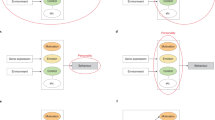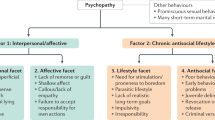Abstract
IN previous communications, others1,2 and ourselves3–5 have dealt principally with factors other than personality structure involved in drug produced model psychoses. The importance of the personality structure was explicitly suggested by Hess6, who emphasized that psychotomimetic compounds “only provoke symptoms which are already potentially present within the cerebral organization…”
This is a preview of subscription content, access via your institution
Access options
Subscribe to this journal
Receive 51 print issues and online access
$199.00 per year
only $3.90 per issue
Buy this article
- Purchase on Springer Link
- Instant access to full article PDF
Prices may be subject to local taxes which are calculated during checkout
Similar content being viewed by others
References
Beringer, K., Der Meskalinrausch: Seine Geschichte und Erscheinungsweise Monographien d. Neurol. u. Psychiatrie H. 49 (Springer, Berlin, 1927).
Leuner, H., Die Experimentelle Psychose (Springer, Berlin, 1962).
Fischer, R., Georgi, F., and Weber, R., Schw. Med. Wschr., 81, 817 (1951).
Fischer, R., J. Ment. Sci., 100, 623 (1954).
Fischer, R., and Agnew, N., Naturwissenschaften, 41, 431 (1954).
Hess, W. R., Methodik der Lokalisierten Reizung und Ausschaltang Subcortikaler Hirnabschnitte (Thiema, Leipzig, 1932).
Myers, I. B., The Myers-Briggs Type Indicator, a Manual (NJ Educational Testing Service, Princeton, 1962).
MacKinnon, D. W., Personality Assessment (edit. by Semeonoff, B.) (Penguin Books, Baltimore, 1966).
McGlothlin, W. H., and Cohen, S., Amer. J. Psychiat., 122, 572 (1965).
Fischer, R., Knopp, W., and Griffin, F., Arzneim.-Forsch. (Drug Res.), 15, 1379 (1965).
Fischer, R., and Griffin, F., Proc. Third World Congress Psychiat., 1, 542 (1961).
Fischer, R., and Griffin, F., Arzneim.-Forsch. (Drug Res.), 14, 673 (1964).
Fischer, R., Griffin, F., and Rockey, M., Persp. Biol. Med., 9, 549 (1966).
Corlis, R., Splaver, G., Wisecup, P., and Fischer, R., Nature, 216, 91 (1967).
Vandenberg, St. G., in Rec. Adv. Biol. Psychiat., 9, 65 (1967).
Hathaway, S. R., and McKinley, J. C., Manual for the Minnesota Multiphasic Personality Inventory (The Psychological Corporation, New York, 1951).
Hofmann, A., J. Exp. Med. Sci., 5, 31 (1961).
Bonhoeffer, K., Die Psychosen im Gefolge von Akuten Infektionen, All-gemeinerkrankungen und inneren Erkrankungen (Aschaffenburgs Hdb. f. Psychiatr. Leipzig u. Wien, Deuticke, 1912).
Author information
Authors and Affiliations
Rights and permissions
About this article
Cite this article
FISCHER, R., MARKS, P., HILL, R. et al. Personality Structure as the Main Determinant of Drug Induced (Model) Psychoses. Nature 218, 296–298 (1968). https://doi.org/10.1038/218296a0
Received:
Revised:
Issue Date:
DOI: https://doi.org/10.1038/218296a0
This article is cited by
-
Characterization and prediction of acute and sustained response to psychedelic psilocybin in a mindfulness group retreat
Scientific Reports (2019)
-
The neurobiology of psychedelic drugs: implications for the treatment of mood disorders
Nature Reviews Neuroscience (2010)
-
An electroencephalographic analysis of personality-dependent performance under psilocybin
Agents and Actions (1971)
-
Interpretation of visual space under drug-induced ergotropic and trophotropic arousal
Agents and Actions (1971)
-
Psilocybin-induced contraction of nearby visual space
Agents and Actions (1970)
Comments
By submitting a comment you agree to abide by our Terms and Community Guidelines. If you find something abusive or that does not comply with our terms or guidelines please flag it as inappropriate.



